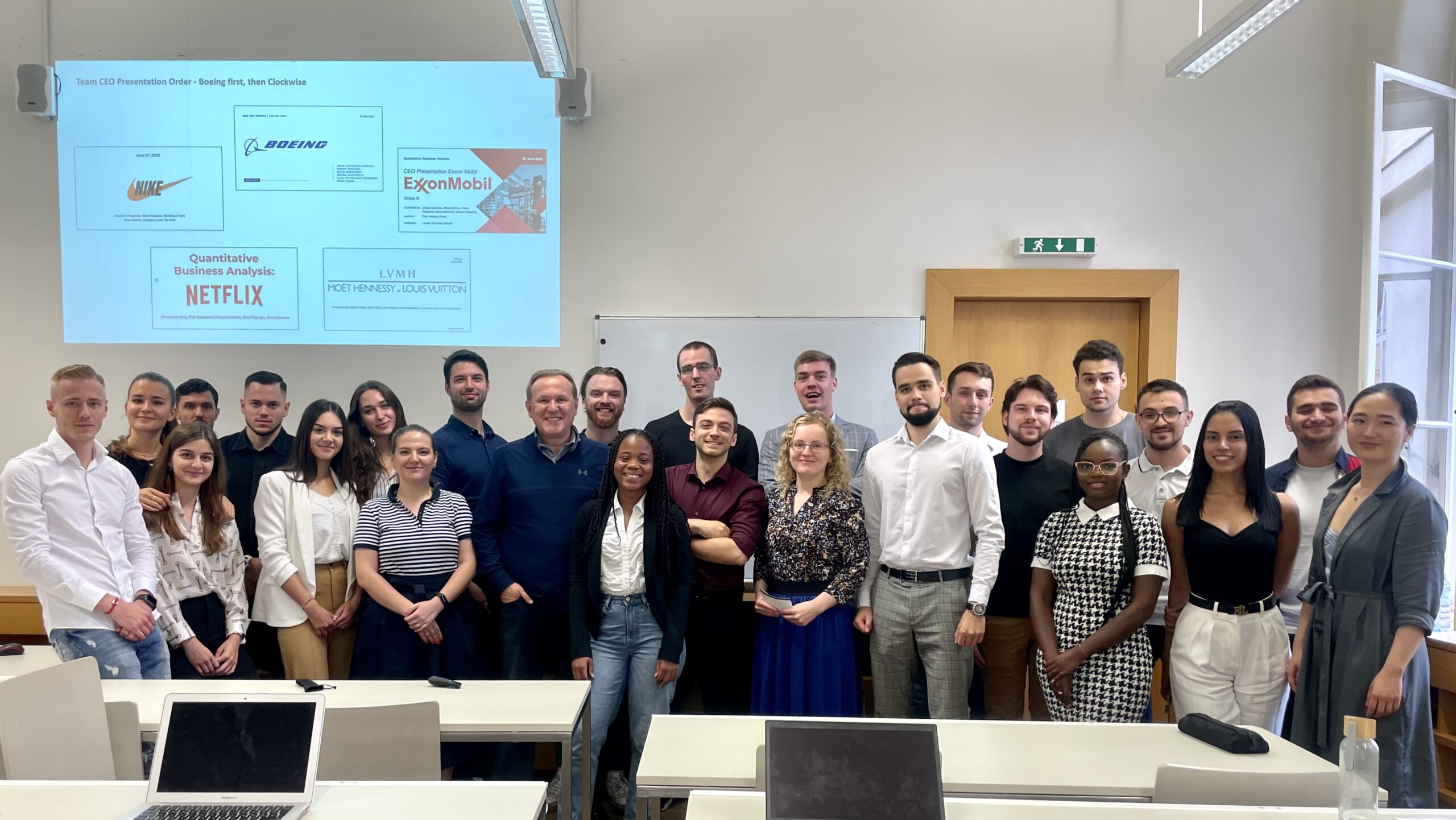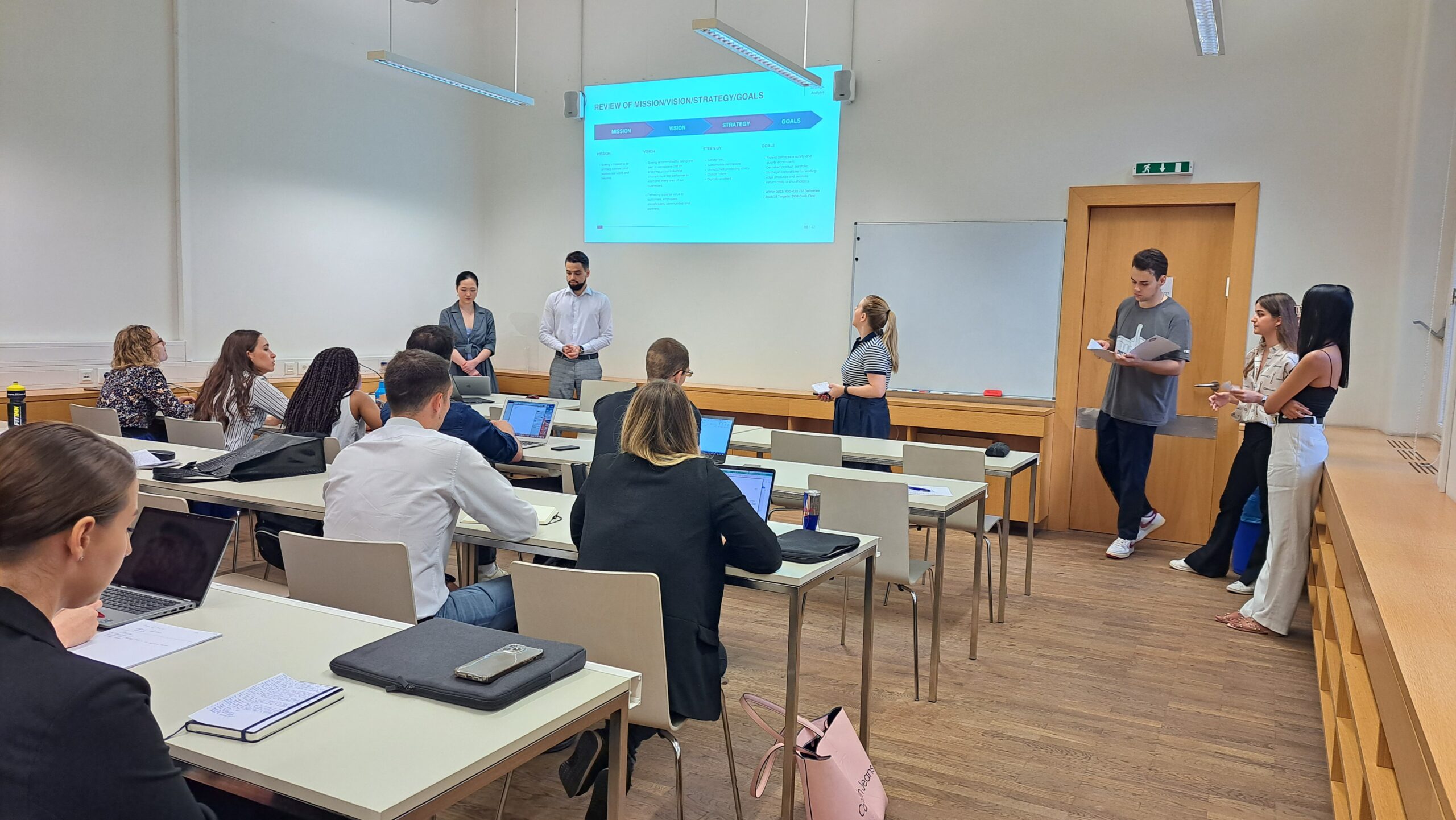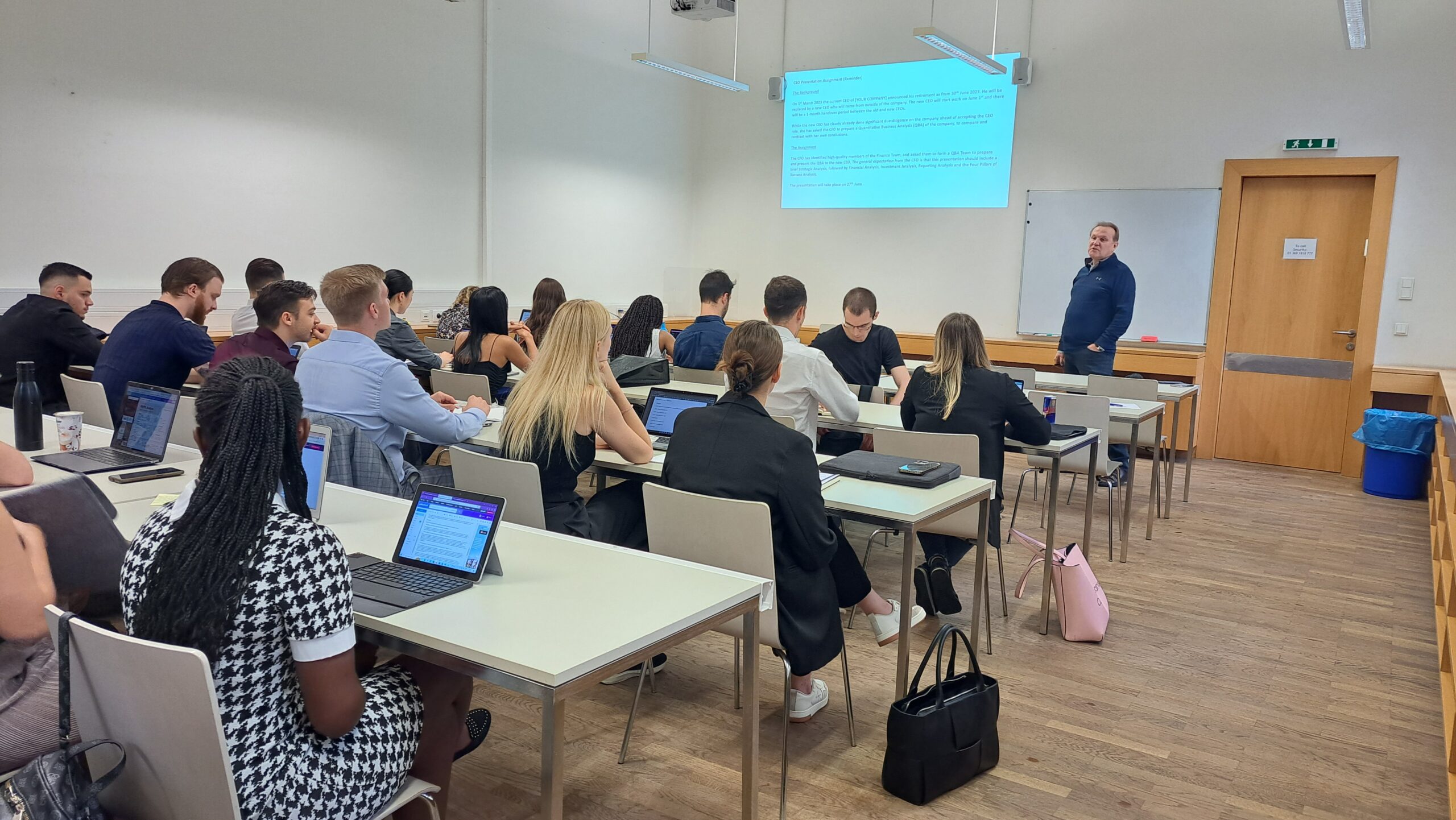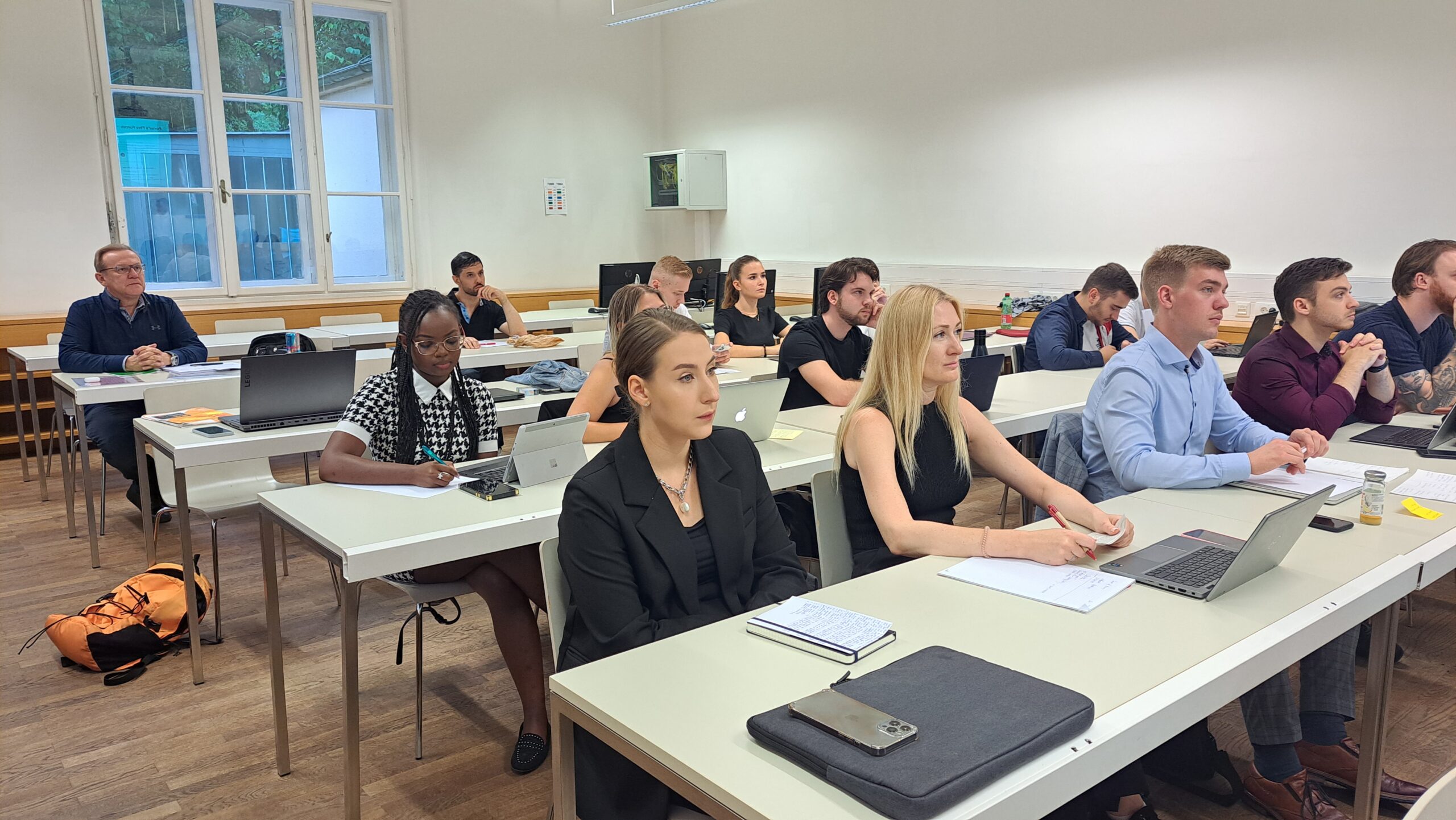Prof. Wood with the International Management and Leadership Master´s students, cohort 2022, in his Quantitative Business Analysis Course.
Last year, world-renowned, multiple award-winning Wall Street Equity Research Analyst Andrew Wood, BSc (Econ), ACA, started as a Lauder Business School lecturer to our Master´s students. After a year of dedicated teaching, we sat down with him to ask about his teaching success, the lessons he’s learned at LBS as well as his aspirations for the years to come.
Mr. Wood joined Bernstein Research as a Wall Street Equity Analyst after C-suite management roles at PepsiCo and Kraft. Over the course of 19 years in New York and Singapore, he and his team published over 3,000 study notes and won various awards, including 10 Extel Awards (“The City Oscars”), among them “Best European Research Analyst” (across all countries and sectors), 15 “Best European Food Analyst” awards, and 9 “Best European Household & Personal Care Analyst” awards. Mr. Wood was voted Institutional Investor‘s most successful European Equity Research Analyst at its 25th anniversary awards in 2016. Master´s students love him in the Introduction to Asset Management and Investing and Quantitative Business Analysis courses.
LBS: Prof. Wood, now that you have been with Lauder Business School for a year as a faculty member, what have been some of the most rewarding aspects of teaching at Lauder Business School? Are there any specific moments or interactions with students that stood out to you?
AW: My first year at Lauder Business School has gone very well… Fortunately, feedback on both courses has been very positive. The students were highly enthusiastic and engaged in the courses, even though they did feel that the courses were extremely intense and hard work. Towards the end of both of my courses, the students worked in teams on an assignment in which they applied many of the concepts we discussed during the course…and then made a 30-40-minute presentation in front of the whole class. In the Introduction to Asset Management and Investing course, this involved developing a 30-company equity portfolio that they will track for the next 18 months while making quarterly adjustments and preparing quarterly reportings. In the Quantitative Business Analysis course, it was the company CEO presentations discussed earlier. The most pleasing part of my time at Lauder Business School so far has been to see how the students have successfully learned, adapted, and presented the concepts discussed in class. As I mentioned previously, the quality of the reports they have written and the presentations they have prepared and given, has been outstanding. Students seem to really appreciate how I was bringing my “real world” experience into the courses and providing practical examples and assignments.
LBS: We know you won many awards in your career as an Equity Analyst, so your outstanding reputation in this industry precedes you. How does this experience shape your teaching approach in Lauder Business School?
AW: My experience as an analyst completely shapes the way that I teach at Lauder Business School course…starting with my over-riding approach to maintain a very good balance of micro and macro business analysis. Throughout the course I use examples from my work and experience on Wall Street…and ask students to replicate some of the work I did. For example, students in both of my courses undertook a detailed analysis of a recent reporting of Nestlé. They assessed expectations/consensus ahead of the reporting, reviewed the press releases, assessed the results/performance and watched management presentations and Q&A, in much the same way as I would have done on Wall Street. As a group we then discussed what longer term implications we could take away from the reporting. Then students prepared a 4-page report on the reporting, following a detailed pro-forma, that many Wall Street analysts would be proud to write. Indeed, I shared some of the students’ reports with management of Nestlé and received very complimentary feedback.
LBS: You also have vast industry experience from your time as Western European CFO for Pepsi and Southern European CEO of Kraft/Nabisco. How do you incorporate industry-specific knowledge into your teaching, and what benefits does it bring to the students?
AW: Yes, my industry background was principally in food and beverages, and my Wall Street experience was principally in food, household goods and personal care. I certainly incorporate my knowledge in these areas into the course, although throughout I try to make the concepts we discuss as applicable to other industries as possible. For example, my Four Pillars of Success framework, that I mentioned in my previous interview, was something I developed in industry to assess potential acquisition targets, but then became a fundamental part of my work in assess companies while I worked on Wall Street. At Lauder Business School it now forms an integral part of the Quantitative Business Analysis course. The Four Pillars look at all of the long-term drivers of success for most companies: i) sustainable top line growth, ii) operating effectiveness, iii) strong cash generation with sensible use of cash, and iv) management quality. These were explained in substantial detail as part of the course, and then the students applied all of their work and learnings to undertake a complete Quantitative Business Analysis of a large multinational company, of their choosing, as part of a group assignment. The student’s presentations to the (imaginary) incoming CEOs of Boeing (Aerospace), ExxonMobil (Integrated Oil), LVMH (Luxury Goods), Netflix (Media/Communication) and Nike (Sports Apparel) were exceptional. I was delighted to see how the students were able to apply many aspects of the Four Pillars framework to other industries. I am confident that most students will use many of their learnings from the Quantitative Business Analysis course as part of their professional experience going forward.
LBS: What are some of the emerging challenges you see in the field of equity research, and how are you preparing your students to navigate them?
AW: Equity research was taught as part of the Introduction to Asset Management and Investing course. The main challenge of equity research is the same as it has always been, and that is to find differentiated ways to undertake and express research and gain insights therefrom. AI is a potentially huge emerging challenge if it leads to the “artificial” preparation of equity research and portfolio recommendations. However, surely it can never replace deep industry experience, or finding or developing analytical tools (like the Four Pillars of Success) upon which research and recommendations can be based. Another emerging challenge to equity research, discussed in my previous interview with you, is the increasingly short-term focus of research and investing…whereas I believe that successful investing and successful research requires a much longer-term focus. In my course, we do not focus on short-term “trading” but instead on longer-term “investing”.
LBS: Reflecting on your own career path, what key lessons have you learned that you believe are fundamental for the emerging business professionals interested in equity research and international business?
AW: From my own experience, I did not know exactly where my career was heading when I left my studies and started work. I knew I wanted to be involved in finance, but I did not know exactly how that would pan out. For example, in my early 20s I never conceived of the idea of becoming an equity analyst…and my route there was through Chartered Accountancy and then my Food & Beverage industry experience discussed earlier. Equity research did not come onto my radar screen until 15 years into my career, and was a dramatic move into a different world: from the food & beverage industry in Europe to equity research on Wall Street in New York. It was a huge risk to make this move…but was an amazing challenge, which proved to be very successful for me. My overriding advice to most students is to not always operate in their comfort-zone, but to be open to new experiences and be prepared to take risks and assume challenges.
LBS: Lastly, what are your goals and aspirations for the future as a faculty member at Lauder Business School? Do you have any interesting projects in the pipeline that we could know about?
AW: As I move into my 2nd year at Lauder Business School, I am focused on improving the 2 courses I taught for the first time last year. I will also teach a 3rd course (Portfolio Management Simulation) on which the students have been working in Terms 2 and Term 3, as discussed above. In Term 4 they will return to class to discuss and present their performance, and their successes and mistakes, and how they learned from these. I am also participating in the new Online MBA in Executive Management that Lauder Business School is launching in September 2024, which is an exciting development for the School, and which should be very interesting and challenging.
LBS: Thank you for your time, Prof. Wood! We look forward to seeing all the wonderful plans you hold for LBS materialize and grow!






Recent Comments